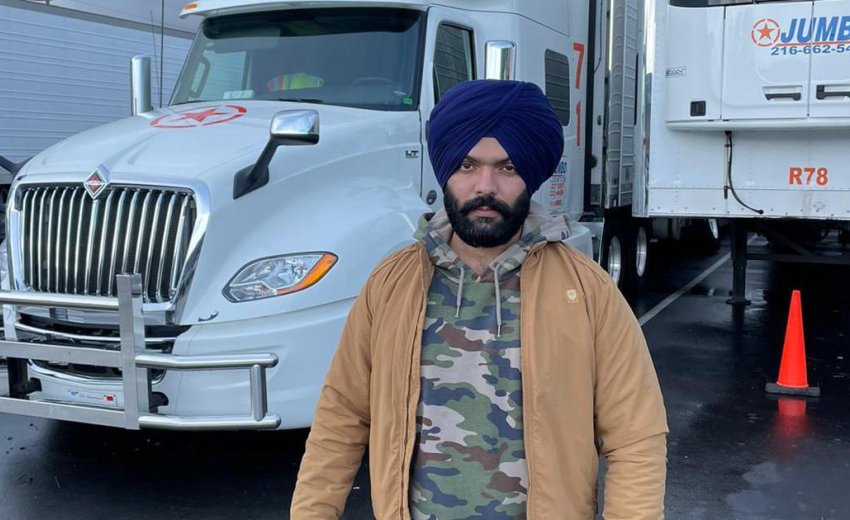In December 2020, Paramjit Singh Sandhu, a 45-year-old truck driver, arrived at a medical institution in Sachse, Texas for a routine drug test.
Sandhu, who resides in Texas, has worked in the trucking industry for over two decades. The federal government requires truck drivers to submit to a drug test. This time, though, when Sandhu arrived at a MedPost Urgent Care centre, a nurse refused to administer one until he removed his dastaar or turban. She continued to refer to it as a ‘hat’.
The incident
Sandhu had taken a drug test just six months before this occurrence, as well as another test at the same facility in the middle of 2019, without having to remove his turban.
He attempted to explain to the nurse that wearing his turban at all times was a religious requirement, but she argued that Federal Motor Carrier Safety Administration laws required him to remove his headwear. In accordance with these regulations, drivers are required to "examine their baggage and remove any extra apparel, including handbags, briefcases, and bulky coats." Even after meeting with a supervisor, he was not accommodated by the hospital facility.
During drug testing, the substantial Sikh trucker population in the United States is often subjected to religious infractions. According to experts and truck drivers, drivers could lose their licences and jeopardise their careers if they fail drug tests. Yet, a number of them are now filing lawsuits.
Asees Kaur, the legal client and community services manager of the Sikh Coalition who led Sandhu’s case, said, “Even though religious freedom regulations exist, Sikhs continue to be disproportionately targeted because they wear turbans and an appearance in accordance with their faith. People should know religious exemptions can be made, and legal help is available.”
Experiences of Sikh truckers
While the initial migration of Indian Sikhs to the United States occurred in the late 1800s and early 1900s — the first American gurudwara was established in 1912 in Stockton, California — there was a substantial increase in migration in the 1980s and 1990s. Some of this was caused by the anti-Sikh riots of 1984 and the subsequent unrest in Punjab. A substantial portion of this immigrant group entered the trucking sector, with Sikh drivers being credited for "transforming" the industry in the United States.
Out of the roughly 500,000 Sikhs who live in the US, it is thought that between 150,000 and 200,000 work as truck drivers. According to reports, Sikhs make up about 18% of drivers in the industry, and 40% of drivers in California.
Yet, this popularity has also increased the community's visibility to the larger American population, leaving it more open to discrimination. Turban wear, skin tone, dress, and, most significantly, language all play a significant impact.
A history of hate
In America, the Sikh community has had to deal with racism, discrimination, and hate crimes for a long time.
As far back as 1907, a considerable number of Sikhs in Bellingham, Washington, then classified as Hindus by the American media, were viciously attacked by a unit of the Asiatic Exclusion League, an anti-immigration hate group. After a mob of 500 white men attacked Sikh workers at a timber mill, the entire community fled the city in haste, cramming onto trains and boats.
After the September 11, 2001, terrorist attacks, there was a big rise in hate crimes against Sikhs, especially when people said they were like "Osama."
After 9/11, the Sikh Coalition was formed to stop violence in the US against Sikhs. More than 200 people ask for help every year with things like discrimination at work, hate crimes, and bullying in school.
Anecdotes of discrimination against Sikhs in America
Kaur, who works for the Sikh Coalition, said that drug testing has been an issue for a long time that they work on. Kaur said that the coalition fought for four Sikh truck drivers who were treated unfairly by JB Hunt, one of the largest trucking companies in the US, from 2008 to 2013.
The employer had requested three of them to cut their hair for drug testing as part of the employment process. This is seen as a humiliating breach of the Sikh habit of naturally growing hair, which is upheld as a show of reverence for God's creation, among other things.
Just like Sandhu, the fourth was asked to take off his turban while giving a urine sample. Kaur said that this was true even though there were other ways to test for drugs, such as nail sampling.
In all four cases, the drivers refused to violate their religious beliefs and, despite being qualified, were denied employment. After the Sikh Coalition got involved, JB Hunt agreed to follow the laws against discrimination and end the case.
In 2015, the Walt Disney Corporation told a Sikh person that he could only deliver mail on a single route in their corporate offices. This kept him out of areas where Disney guests hang out, which was against the company's "look policy." On the other hand, Gurdit Singh's coworkers were able to switch routes every three weeks and deliver mail right in front of Disney's customers.
During his seven years at the company, Gurdit wasn't able to move up in his job, and some of his coworkers were even mean to him. After the Sikh Coalition and the American Civil Liberties Union stepped in, Disney finally agreed to stop singling Singh out and let him change his delivery route.
Freedom of religion
The Sikh Coalition said that the turban was a requirement of the Sikh faith in a letter it sent to the hospital that Sandhu visited in December. The letter said, “ “Forced removal of the turban is perceived as one of the most humiliating and hurtful physical injuries that can be inflicted upon a Sikh and amounts to a denial of the freedom of religion.”
The turban is a part of the Sikh religion that everyone must wear. Sikh turbans are more than just headbands; they have important religious meanings. A turban, on the other hand, must always be on a Sikh's head. It reminds a Sikh of his or her duty to keep and uphold the core beliefs of the Sikh faith, which include working hard and honestly, helping those in need, and promoting the equality of all people. When a Sikh puts on a turban, it stops being just a piece of cloth and becomes one with the person's body.
In South Asia in the 18th century, Sikhs were persecuted and forced to change their religion. One way this was done was by taking away a Sikh's turban and cutting off his hair. Since then, taking a Sikh's turban away by force and cutting his hair has been a sign of not letting that person be a member of the Sikh faith. So, forcing a Sikh to take off their turban is seen as one of the most humiliating and hurtful things that can happen to them physically. It is also seen as a violation of their freedom of religion.
After the letter was sent, the MedPost supervisor called Sandhu and asked him to come back for the test. In January 2021, he passed his drug test with the help of a religious exemption. Kaur said that fighting cases like Sandhu's would make sure that other Sikhs who walk into a MedPost facility will be taken care of and won't have their rights violated in the same way.
*Based on an article by Anisha Sircar published in Scroll.in on 12th March 2021

